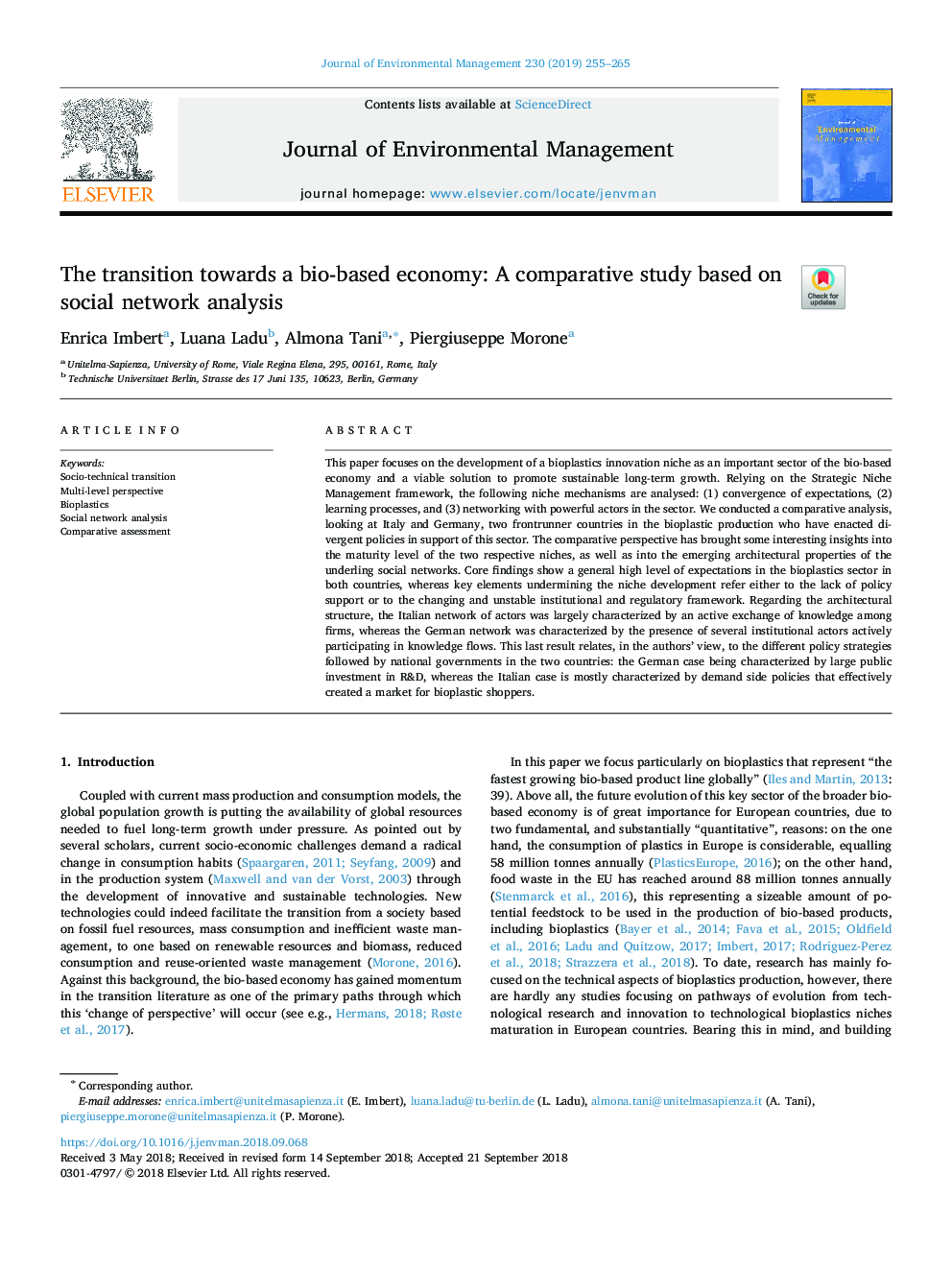| کد مقاله | کد نشریه | سال انتشار | مقاله انگلیسی | نسخه تمام متن |
|---|---|---|---|---|
| 11023242 | 1701321 | 2019 | 11 صفحه PDF | دانلود رایگان |
عنوان انگلیسی مقاله ISI
The transition towards a bio-based economy: A comparative study based on social network analysis
ترجمه فارسی عنوان
انتقال به سوی یک اقتصاد مبتنی بر زیست شناسی: یک مطالعه مقایسه ای بر اساس تجزیه و تحلیل شبکه های اجتماعی
دانلود مقاله + سفارش ترجمه
دانلود مقاله ISI انگلیسی
رایگان برای ایرانیان
کلمات کلیدی
انتقال اجتماعی و فنی، چشم انداز چند مرحله ای، بیوپلاستی، تجزیه و تحلیل شبکه شبکه، ارزیابی مقایسهای،
ترجمه چکیده
این مقاله بر توسعه یک رویکرد نوآوری بیوپلاستی به عنوان بخش مهمی از اقتصاد مبتنی بر زیست شناختی و راه حل مناسب برای ترویج رشد پایدار درازمدت تمرکز دارد. با تکیه بر چارچوب مدیریت راهبرد استراتژیک، مکانیزمهای زیربنایی زیر تجزیه و تحلیل می شوند: (1) همگرایی انتظارات، (2) فرایندهای یادگیری، و (3) شبکه سازی با بازیگران قدرتمند در بخش. ما یک تحلیل تطبیقی را انجام دادیم، به دنبال ایتالیا و آلمان، دو کشور متخاصم در تولید بیوپلاستی که سیاست های متفاوتی را برای حمایت از این بخش اعمال کرده اند. چشم انداز تطبیقی برخی از دیدگاه های جالب را در سطح بلوغ دو نیش های خاص و نیز ویژگی های معماری در حال ظهور شبکه های اجتماعی زیرزمینی به ارمغان آورده است. یافته های اصلی نشان می دهد که انتظارات عمومی در بخش بیوپلاستی در هر دو کشور، انتظار می رود، در حالی که عناصر کلیدی که از توسعه طغیان جلوگیری می کنند، به فقدان حمایت سیاسی یا چارچوب نهائی و نظارتی در حال تغییر و ناپایدار اشاره می کنند. با توجه به ساختار معماری، شبکه ایتالیایی بازیگران تا حد زیادی توسط تبادل فعالانه دانش در میان شرکت ها مشخص می شد، در حالی که شبکه های آلمانی با حضور چندین بازی سازمانی که به طور فعال در جریان دانش حضور داشتند، مشخص شد. این نتیجه نهایی، در دیدگاه نویسندگان، به استراتژی های مختلف سیاست که توسط دولت های ملی در دو کشور مطرح می شود، مربوط می شود: پرونده های آلمان با سرمایه گذاری عمومی بزرگ در تحقیق و توسعه، در حالی که پرونده ایتالیا عمدتا با سیاست های سمت تقاضا است که به طور موثر یک بازار برای خریداران بیوپلاستی ایجاد کرد.
موضوعات مرتبط
مهندسی و علوم پایه
مهندسی انرژی
انرژی های تجدید پذیر، توسعه پایدار و محیط زیست
چکیده انگلیسی
This paper focuses on the development of a bioplastics innovation niche as an important sector of the bio-based economy and a viable solution to promote sustainable long-term growth. Relying on the Strategic Niche Management framework, the following niche mechanisms are analysed: (1) convergence of expectations, (2) learning processes, and (3) networking with powerful actors in the sector. We conducted a comparative analysis, looking at Italy and Germany, two frontrunner countries in the bioplastic production who have enacted divergent policies in support of this sector. The comparative perspective has brought some interesting insights into the maturity level of the two respective niches, as well as into the emerging architectural properties of the underling social networks. Core findings show a general high level of expectations in the bioplastics sector in both countries, whereas key elements undermining the niche development refer either to the lack of policy support or to the changing and unstable institutional and regulatory framework. Regarding the architectural structure, the Italian network of actors was largely characterized by an active exchange of knowledge among firms, whereas the German network was characterized by the presence of several institutional actors actively participating in knowledge flows. This last result relates, in the authors' view, to the different policy strategies followed by national governments in the two countries: the German case being characterized by large public investment in R&D, whereas the Italian case is mostly characterized by demand side policies that effectively created a market for bioplastic shoppers.
ناشر
Database: Elsevier - ScienceDirect (ساینس دایرکت)
Journal: Journal of Environmental Management - Volume 230, 15 January 2019, Pages 255-265
Journal: Journal of Environmental Management - Volume 230, 15 January 2019, Pages 255-265
نویسندگان
Enrica Imbert, Luana Ladu, Almona Tani, Piergiuseppe Morone,
